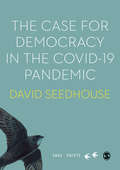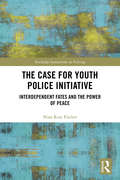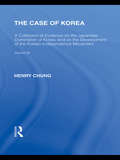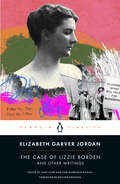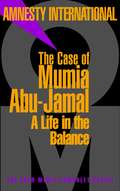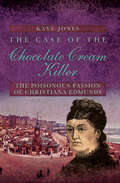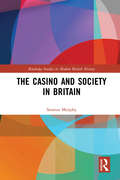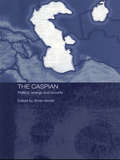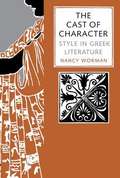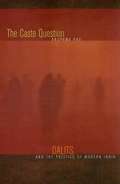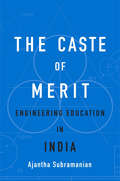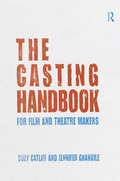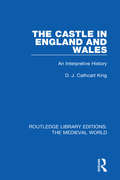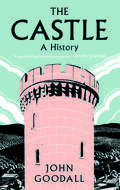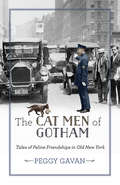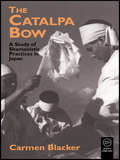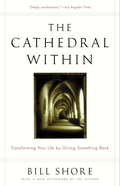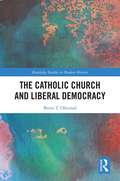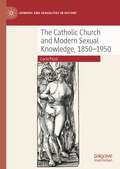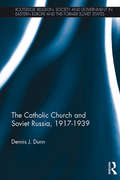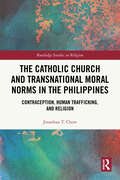- Table View
- List View
The Case for Democracy in the COVID-19 Pandemic (SAGE Swifts)
by David SeedhouseOne moment life was normal, the next, governments around the world were imposing radical lockdowns of their populations. But why were decision-makers so readily ignoring centuries of hard-won civil freedoms? Where was the discussion of ethics and human rights? Why were we so easily controlled and why were our controllers so willing to do it? In The Case for Democracy, David Seedhouse explores the psychological biases; distorted risk perceptions; frenetic journalism; the disputed science; the narrow focus of ′experts′; value judgements dressed up as truths; propaganda; the invisibility of ethics; and the alarming irrelevance of inclusive democracy that have been features of governmental responses to the covid-19 pandemic. Seedhouse argues that the chaotic governmental response to Coronavirus, with no attempt to include the public, is the perfect argument for an extensive, participatory democracy; a democracy that demonstrates practical decision making by listening to everyone’s knowledge and expertise. Now is the time for us to solve our problems together.
The Case for Democracy in the COVID-19 Pandemic (SAGE Swifts)
by David SeedhouseOne moment life was normal, the next, governments around the world were imposing radical lockdowns of their populations. But why were decision-makers so readily ignoring centuries of hard-won civil freedoms? Where was the discussion of ethics and human rights? Why were we so easily controlled and why were our controllers so willing to do it? In The Case for Democracy, David Seedhouse explores the psychological biases; distorted risk perceptions; frenetic journalism; the disputed science; the narrow focus of ′experts′; value judgements dressed up as truths; propaganda; the invisibility of ethics; and the alarming irrelevance of inclusive democracy that have been features of governmental responses to the covid-19 pandemic. Seedhouse argues that the chaotic governmental response to Coronavirus, with no attempt to include the public, is the perfect argument for an extensive, participatory democracy; a democracy that demonstrates practical decision making by listening to everyone’s knowledge and expertise. Now is the time for us to solve our problems together.
The Case for Vaccine Mandates
by Alan DershowitzIn The Case for Vaccine Mandates, Alan Dershowitz—New York Times bestselling author and one of America&’s most respected legal scholars—makes an argument, against the backdrop of ideologically driven and politicized objections, for mandating (with medical exceptions) vaccinations as a last resort, if proved necessary to prevent the spread of COVID. Alan Dershowitz has been called &“one of the most prominent and consistent defenders of civil liberties in America&” by Politico and &“the nation&’s most peripatetic civil liberties lawyer and one of its most distinguished defenders of individual rights&” by Newsweek. He is also a fair-minded and even-handed expert on civil liberties and constitutional rights, and in this book offers his knowledge and insight to help readers understand how mandated vaccination and compulsion to wearing masks should and would be upheld in the courts. The Case for Vaccine Mandates offers a straightforward analytical perspective: If a vaccine significantly reduces the threat of spreading a serious and potentially deadly disease without significant risks to those taking the vaccine, the case for governmental compulsion grows stronger. If a vaccine only reduces the risk and seriousness of COVID to the vaccinated person but does little to prevent the spread or seriousness to others, the case is weaker. Dershowitz addresses these and the issue of masking through a libertarian approach derived from John Stuart Mill, the English philosopher and political economist whose doctrine he summarizes as, &“your right to swing your fist ends at the tip of my nose.&” Dershowitz further explores the subject of mandates by looking to what he describes as the only Supreme Court decision that is directly on point to this issue; decided in 1905, Jacobson v. Massachusetts involved a Cambridge ordinance mandating vaccination against smallpox and a fine for anyone who refused. In the end, The Case for Vaccine Mandates represents an icon in American law and due process reckoning with what unfortunately has become a reflection of our dangerously divisive age, where even a pandemic and the responses to it, divide us along partisan and ideological lines. It is essential reading for anyone interested in a non-partisan, civil liberties, and constitutional analysis.
The Case for Youth Police Initiative: Interdependent Fates and the Power of Peace (Routledge Innovations in Policing)
by Nina Rose FischerThis book investigates the Youth Police Initiative (YPI) intervention with a comprehensive look at its effects in Boston as well as Brownsville, Brooklyn, a neighborhood that has both rich community networks as well as the highest crime rate in New York City. Based on a phenomenological approach, The Case for Youth Police Initiative: Interdependent Fates and the Power of Peace offers first-person narratives of youth, police, and community members in Brownsville as the YPI program was put into action Police shootings and other negative exchanges between community members and the police have brought heightened awareness to the volatile relations between communities and police. The North American Family Institute began the YPI in Baltimore in 2003 with the ambition of keeping vulnerable youth away from arrests, gangs, guns, violence, and death. The program has been replicated in several communities in the United States and beyond. The focus of YPI training is to address the dual challenge of teaching youth the skills to resolve daily conflicts with authority while also teaching police officers to have meaningful dialogue with young people. The voices of the stakeholders reveal changes in attitudes and actions from before, during, and after YPI’s implementation. A comprehensive illustration of the intervention’s arc provides the reader with an in-depth, textured perspective of what it takes to prevent pernicious eruptions of tension between police and the community they are charged to serve and protect. YPI’s success in addressing tensions between youth and police in Boston and Brownsville, Brooklyn, maps out a blueprint for progress in other communities. Suitable for scholars and researchers in juvenile justice, law enforcement, psychology, and social work as well as practitioners on the front lines, The Case for Youth Police Initiative will provoke dialogue on best practices for changing the volatile climate between police and the youths in their communities.
The Case for the Jordan Lead Codices
by Margaret Barker Jennifer Elkington David Elkington Keith Hearne Philip DaviesThe Case For the Jordan Lead Codices presents a series of essays by eminent scholars underlining the case for proper analysis and restoration of the codices back to Jordan. For the first time, a very thorough analysis of the metal and its origins is argued by a senior analyst in the private sector.David Elkington provides a brief account of the discovery. Added to this is a groundbreaking article by Dr Margaret Barker placing the codices in their proper historical and theological context, arguing for their authenticity and the need for further research. Her case is underscored by Prof Philip Davies, the man who was prominent in breaking the embargo on the Dead Sea Scrolls in the early 1990s. An essay by Dr Keith Hearne, one of the world's foremost psychologists, explores the effect of unscrupulous blogging on the delivery of fact and context in history. He discusses the case for religious 'shock' in the light of the implications of the discovery.Jennifer Elkington discusses the effect of the Thoneman affair in the context of proper academic behaviour whilst revealing the fact that very few individuals have had, or asked for access to, proper samples and analysis of the codices.
The Case of Korea: A Collection Of Evidence On The Japanese Domination Of Korea, And On The Development Of The Korean Independence Movement (classic Reprint) (Routledge Library Editions: Japan)
by Henry ChungThis volume examines how and why Japan annexed Korea in the early twentieth century and discusses the role of foreign powers (particularly the USA) in trying to bring about freedom and independence for Korea. Written by a Korean living in the USA the book is at times a harrowing account of atrocities committed by Japan against Koreans. Entirely impartial it is obviously not, but it nonetheless covers an important if tragic part of history in East Asia.
The Case of Lizzie Borden and Other Writings: Tales of a Newspaper Woman
by Elizabeth Garver JordanThe first and only comprehensive collection of writings by Elizabeth Garver Jordan, the groundbreaking journalist, suffragist, and editor whose fearless reporting on women preceded the #MeToo movement and popularized the true-crime genreA Penguin ClassicThe Case of Lizzie Borden and Other Writings is the first to collect Garver Jordan&’s fiction and journalism, much of which has been out of print for over a century. Jordan began her career as a reporter, making her name as one of few women journalists to cover the Lizzie Borden murder trial for the New York World in 1893. Jordan&’s distinctive, narrative-driven coverage of the Borden and other high-profile murder cases brought her national visibility, and she turned increasingly to fiction writing. Drawing on her experiences as a true-crime reporter and newspaper editor, she published detective novels and short story collections such as Tales of the City Room that explored the fine line between women&’s criminality and crimes against women. Employing popular genre conventions as a means of dealing with women&’s issues, Jordan exposed gendered abuse in the workplace and the prevalence of sexual violence. The Case of Lizzie Borden and Other Writings encourages readers to draw a historical trajectory from Jordan&’s pioneering literary activism to the writings of contemporary journalists and novelists whose work continues to fuel discussions of gender, feminism, and crime, raising questions about who gets to tell women&’s stories, especially in the wake of the #MeToo movement.
The Case of Mumia Abu-Jamal: A Life in the Balance (Open Media Series)
by Amnesty InternationalMumia Abu-Jamal has been incarcerated on Pennsylvania's death row for over two decades. His case has generated more controversy and received more attention, both national and international, than that of any other inmate currently under sentence of death in the United States of America.Mumia Abu Jamal, black, was convicted and sentenced to death in July 1982 for the murder of white police officer Daniel Faulkner on December 9, 1981. He has steadfastly maintained his innocence. Since the trial, those advocating his release or retrial have contested the validity of much of the evidence used to obtain his conviction. These accusations have been countered by members of the law enforcement community and their supporters, who have agitated for Abu-Jamal's execution while maintaining that the trial was unbiased.Based on its review of the trial transcript and other original documents, human rights organization Amnesty International believes that the interests of justice would best be served by the granting of a new trial to Mumia Abu-Jamal. This pamplet explains why.
The Case of the Chocolate Cream Killer: The Poisonous Passion of Christiana Edmunds
by Kaye JonesThe true story of the seemingly respectable woman convicted of a murderous spree in Victorian-era Brighton, England. In 1871, when the news broke of a series of mysterious poisonings in the popular resort town of Brighton, shock and horror gripped the public. Even more disturbing was the revelation that the culprit was not a common criminal but a local &“lady of fortune,&” Christiana Edmunds. Starting in March, Christiana had sent out dozens of poisoned chocolates and sweets to Brighton&’s residents. Her campaign resulted in the death of four-year-old vacationer Sidney Barker, and wounded countless others. Her arrest in August provoked such an emotional response from the local public that her trial was moved from Brighton to London&’s Old Bailey. The prosecution anticipated an easy victory. Christiana had not confessed, but witnesses confirmed she had purchased strychnine and their testimonies placed her at the scenes of the crimes. She had a motive too, argued the prosecution; she was a scorned woman. Despite the defense&’s best efforts, the jury took only one hour to convict her of the murder of Sidney Barker and the attempted murder of three others. This book tells the engrossing story of the crime, the trial, the darker underworld of Victorian Brighton, and the ultimate fate of Christiana Edmunds.
The Casino and Society in Britain (Routledge Studies in Modern British History)
by Seamus MurphyThis book is a study of the British casino industry and how it has been shaped by criminality, prohibition, regulation and liberalization since the beginning of the First World War. The reader will gain a detailed knowledge of the history, culture, identity and participants within the British casino industry, which has, to date, escaped the attention of a dedicated historical and criminological investigation. This monograph fills this gap in inquiry while drawing on primary source material that has not been used previously, including, but not confined to, records in the National Archives relating to the Gaming Board of Great Britain and the Metropolitan Police. In addition to archive material, oral histories, newspapers, published journals and books have been utilised and referenced where appropriate. Envisaged to close a gap in historical research, this book will be of interest to historians, criminologists, regulators, students and individuals interested in gambling, society and cultural history.
The Caspian: Politics, Energy and Security (Central Asia Research Forum)
by Shirin AkinerThe Caspian redefines a Caspian debate long characterized by one-sided and politically motivated analyses and, at times, fantastic reporting. Bringing together a range of influential voices from academia, the media, the oil industry, civil service, the military and diplomatic corps, this book rewrites the region's recent history.
The Cast of Character: Style in Greek Literature
by Nancy WormanShe demonstrates that, as liars and imitators, pleasing storytellers, and adept users of costume, these two figures are especially skillful manipulators of style. In tracing the way literary representations of them changed through time—from Homer's positive portrayal of their subtle self-presentations to the sharply polarized portrayals of these same subtleties in classical tragedy and oratory—Worman also uncovers a nascent awareness among the Greek writers that style may be used not only to persuade but also to distract and deceive.
The Caste Question: Dalits and the Politics of Modern India
by Anupama RaoThis book tells the story of how untouchables became Dalits and addresses the constitutive relationship between Dalit emancipation and Indian democracy. It is an account of how the stigma of being "untouchable" was redefined as an identity and of how this identity eventually became politically powerful.
The Caste of Merit: Engineering Education in India
by Ajantha SubramanianJust as Americans least disadvantaged by racism are most likely to call their country post‐racial, Indians who have benefited from upper-caste affiliation rush to declare their country a post‐caste meritocracy. Ajantha Subramanian challenges this belief, showing how the ideal of meritocracy serves the reproduction of inequality in Indian education.
The Casting Handbook: For Film and Theatre Makers
by Suzy Catliff Jennifer GranvilleCasting is a crucial creative element of any production - and yet the craft and skills needed to put together a successful and exciting cast are often overlooked. The Casting Handbook explains the casting process from beginning to end and covers everything producers and directors needs to know – as well as proving a fascinating and illuminating read for actors. The book explores: how to prepare a breakdown where to source actors how to prepare for a casting session how to make casting decisions how a cast is put together how deals are done ethics and the law, with special reference to casting children how a casting director contributes to the initial development of the script how the casting works from fringe theatre to Hollywood blockbusters The Casting Handbook considers actors’, producers’, agents’ and directors’ relationship with a casting director, the day to day work that is casting, and how approaching it in a professional and informed manner can make the difference to the final product. Including interviews with actors, agents, directors, casting directors and producers; case studies; exercises; and a fact file of useful templates and contacts, this book offers a thorough induction into the casting process, suitable for students and early career professionals in any media.
The Castle in England and Wales: An Interpretive History (Routledge Library Editions: The Medieval World #27)
by D.J. Cathcart KingOriginally published in 1988, The Castles in England and Wales is a comprehensive treatment of the archaeology of the castles in England and Wales. The books looks at how following the Norman Conquest, one of the most characteristic structures of the English landscape, the castle, was used to control and survey the population. In its simplest definition a castle is a fortified habitation, however this book looks at the many uses of castles, from their most primitive kind, intended only for periodic use, or as magnificent decoration, such as Caernarvon and other Welsh castles of Edward I. It is essential reading for all archaeologists and historians alike.
The Castle: A History
by John GoodallA vibrant history of the castle in Britain, from the early Middle Ages to the present day The castle has long had a pivotal place in British life, associated with lordship, landholding, and military might, and today it remains a powerful symbol of history. But castles have never been merely impressive fortresses—they were hubs of life, activity, and imagination. John Goodall weaves together the history of the British castle across the span of a millennium, from the eleventh to the twenty-first century, through the voices of those who witnessed it. Drawing on chronicles, poems, letters, and novels, including the work of figures like Gawain Poet, Walter Scott, Evelyn Waugh, and P. G. Wodehouse, Goodall explores the importance of the castle in our culture and society. From the medieval period to Civil War engagements, right up to modern manifestations in Harry Potter, Goodall reveals that the castle has always been put to different uses, and to this day continues to serve as a source of inspiration.
The Cat Men of Gotham: Tales of Feline Friendships in Old New York
by Peggy GavanThe nineteenth century was a rough time to be a stray cat in New York City. The city’s human residents dealt with feline overpopulation by gassing unwanted cats or tossing them in rivers. But a few lucky strays were found by a diverse array of men—including firemen, cops, athletes, and politicians—who rescued them from the streets and welcomed them into their homes and hearts. This book tells the stories of these heroic cat men of Gotham and their beloved feline companions. Not only does it introduce us to some remarkable men, but we get to meet many extraordinary cats as well, from Chinese stowaways prowling the Chelsea Piers to the sole feline survivor of the USS Maine explosion. Among the forty-two profiles, we find many feline Cinderella stories, as humble alley cats achieved renown as sports team mascots, artists’ muses, and even presidential pets. Sure to appeal to cat fanciers and history fans alike, The Cat Men of Gotham will give you a new appreciation for Old New York and the people and animals who made it their home. As it takes you on a journey through the streets of Manhattan and Brooklyn, it will amuse and astound you with tales of powerful men and their pussycats.
The Catalpa Bow: A Study of Shamanistic Practices in Japan (Japan Library Classic Paperback Ser.)
by Carmen BlackerThis classic work describes shamanic figures surviving in Japan today, their initiatory dreams, ascetic practices, the supernatural beings with whom they communicate, and the geography of the other world in myth and legend.
The Cathedral Within
by Bill ShoreIn this wise and inspiring book, social entrepreneur Bill Shore shows us how to make the most of life and do something that counts. Like the cathedral builders of an earlier time, the visionaries described in this memoir share a single desire: to create something that endures. The extraordinary people Shore has met on his travels represent a new movement of citizens who are tapping into the vast resources of the private sector to improve public life. Among them are: -- Gary Mulhair, who has created unprecedented jobs and wealth at the largest self-supporting human-service organization of its kind, Pioneer Human Services of Seattle. -- Nancy Carstedt of the Chicago Childrenís Choir, which provides thousands of children their first introduction to music. -- Geoffrey Canada, who has made a safe haven for more than four thousand inner-city children in New York City, from Hell's Kitchen to Harlem. These leaders, and many others described in these pages, have built important new cathedrals within their communities, and by doing so they have transformed lives, including their own.
The Cathedrals of Pisa, Siena and Florence: A Thorough Inspection of the Medieval Construction Techniques (Built Heritage and Geotechnics)
by Pietro Matracchi Luca GiorgiThe construction techniques and concepts of the cathedrals of Pisa, Siena and Florence are examined in detail, based on new data and using a methodological architectural diagnostics approach. New detailed surveys, carried out using often advanced tools, together with direct and in-depth inspections to examine all parts of the buildings, have enabled us to identify the building phases and the different construction techniques used over time. The information thereby acquired also formed the basis for a new interpretation of the archival documents. Accordingly, the problems encountered and the solutions adopted in the three cathedrals have been understood: in Pisa the construction of the elliptical dome above the rectangular crossing consisting of six thin pillars below; in Siena the design changes from the first system in the 13th century to the ‘Duomo Nuovo’, and the structural adaptations following earthquakes; the specific construction solutions adopted in Florence during the instability encountered in the construction of the large vaults of the basilican body. The comparison of the three buildings in terms of architectural and construction solutions also revealed unexpected relationships between the construction events of Siena’s Duomo Nuovo and the solutions then used in the large basilican body of Santa Maria del Fiore. The methodology employed has led to an understanding of the actual structure of the three cathedrals, an essential basis for a correct evaluation of the state of conservation of the churches for any restoration work. The book is aimed at scholars of architecture and ancient building structures, graduate and postgraduate students, and architects and engineers who plan architectural conservation and strengthening works for historical buildings.
The Catholic Church and Liberal Democracy (Routledge Studies in Modern History)
by Bernt Torvild OftestadThe Roman Catholic Church's critical stance towards liberalism and democracy following the French Revolution and through the 19th century was often entrenched, but the Second Vatican Council of the 1960s saw a shift in the Church's attitude towards democracy. In recent years, a conflict has emerged between Church doctrine and modern liberalism under Popes John Paul II and Benedict XVI. This book is a comprehensive overview of the Catholic Church's relationship to modern liberal democracy, from the end of the 18th century until today. It is a connection that is situated within the context of the history of ideas itself.
The Catholic Church and Modern Sexual Knowledge, 1850-1950 (Genders and Sexualities in History)
by Lucia PozziThis book is the first to present a comprehensive historical picture of the modern Catholic concern with the body and sexuality. The Catholic church is commonly believed to have always opposed birth control and abortion throughout the centuries. Yet the Catholic encounter with modern sexuality has a more complex and interesting history. What was the meaning of sexual purity? Why did eugenics matter to Catholicism? How did the Society of Jesus interpret the idea of overpopulation? Why did Pius XI decide to issue the notorious encyclical Casti connubii on Christian marriage – the first modern papal pronouncement on birth control, abortion, and eugenics? In answering these questions, Lucia Pozzi uncovers new archival and unpublished records to dig into Catholic responses to modern sexual knowledge, showing the Catholic church at times resisting, but also often welcoming, scientific modernity.
The Catholic Church and Soviet Russia, 1917-39 (Routledge Religion, Society and Government in Eastern Europe and the Former Soviet States)
by Dennis J. DunnThis book, based on extensive research including in the Russian and Vatican archives, charts the development of relations between the Catholic Church and the Soviet Union from the Bolshevik Revolution of 1917 to the death of Pope Pius XI in 1939. It provides background information on the animosity between the Orthodox and Catholic churches and moves towards reconciliation between them, discusses Soviet initiatives to eradicate religion in the Soviet Union and spread atheist international communism throughout the world, and explores the Catholic Church’s attempts to survive in the face of persecution within the Soviet Union and extend itself. Throughout the book reveals much new detail on the complex interaction between these two opposing bodies and their respective ideologies.
The Catholic Church and Transnational Moral Norms in the Philippines: Contraception, Human Trafficking, and Religion (Routledge Studies in Religion)
by Jonathan T. ChowJonathan T. Chow explores the Roman Catholic Church’s engagement with transnational human rights norms and how its understandings of Catholic identity and doctrine have profoundly shaped the politics surrounding contraception and human trafficking in the Philippines.In the global politics of morality, the Catholic Church is one of the world’s foremost practitioners, shaping not only the language of transnational moral norms but also how they are implemented at the domestic level. Through “norm thickening”—connecting transnational norms to deeply held local identities and religious teachings and institutionalizing those connections in policies, practices, and organizations—the book argues that the Church can build a more coherent and locally credible moral basis for transnational norms than international consensus alone. While in some cases, this can strengthen transnational norms and facilitate cooperation between the Church and the government, in other cases it can instead harden opposition to those norms and facilitate polarization, with significant consequences for Philippine society. Drawing on field interviews in the Philippines, as well as Vatican and UN documents, Chow paints a compelling picture of how one of the world’s largest religions shapes the global moral landscape.This book will be of particular interest to students of religion, Catholic theology, human rights, international relations theory, and Asian studies, and anyone seeking to better understand the transnational politics of morality.
